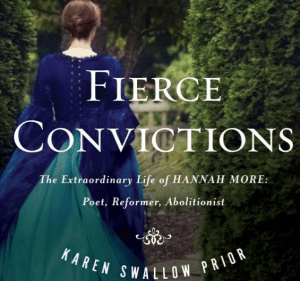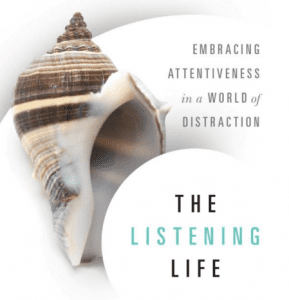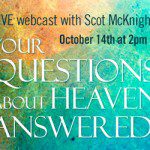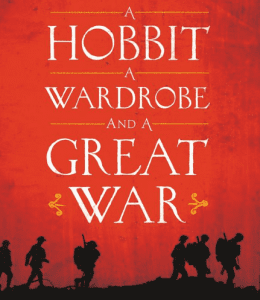 Karen Swallow Prior is Professor of English at Liberty University. She writes regularly for publications like Christianity Today and The Atlantic. The following interview revolves around Karen’s most recent book, Fierce Convictions: The Extraordinary Life of Hannah More-Poet, Reformer, Abolitionist.
Karen Swallow Prior is Professor of English at Liberty University. She writes regularly for publications like Christianity Today and The Atlantic. The following interview revolves around Karen’s most recent book, Fierce Convictions: The Extraordinary Life of Hannah More-Poet, Reformer, Abolitionist.
David George Moore conducted the interview. Dave blogs at www.twocities.org.
Moore: You did your doctoral dissertation (Hannah More and the Evangelical Influence on the Rise of the English Novel) on Hannah More. What first led you to spend so much time with her, and why did you decide to write another book on her, albeit for a wider audience?
Prior: My area of expertise is the early English novel. In doing my doctoral research, I was studying an earlier and better known novelist, Samuel Richardson, when I stumbled across Hannah More because of her membership in a circle of literary women who read the early manuscripts of Richardson’s novels. As soon as I read about her and learned that she had written a very popular but long-forgotten novel, I knew I wanted to write my dissertation on her. After I defended the dissertation, one of my professors urged me to write a popular biography of More.
Moore: I get curious about dedications, acknowledgements, and obscure footnotes (or in your case, endnotes). I asked you earlier about the dedication to Peter Hare. Would you recap what you told me?
Prior: Peter Hare was the professor, above, who first envisioned a biography of More for a general readership. Dr. Hare was a highly-regarded, widely-published philosophy professor and a self-described agnostic. Despite our different beliefs, he was a great supporter of my efforts in establishing and running an inner-city school during the years I was writing my dissertation. He became a dear friend and was a great encourager and mentor to me. He died some years before I was able to write this book, so, sadly, he did not get to see his idea come to fruition. Dedicating the book to him is just a small acknowledgement of his role in my life and this book.
Moore: Throughout your book, I put marginal notes which read, “The pen is mightier than the sword.” What made More convinced that words could effect deep and lasting change?
Prior: Of course, More lived in a very literary age, an age when literacy was spreading and authors were increasing as the patronage system was replaced by the free market. She herself was greatly influenced from childhood by the literature she read. Yet, beyond this, I think that being a woman—who had few other options for exerting influence and power—the pen was really the only means she had to express her voice and make a difference in her society.
Moore: I think you did a good job of navigating between writing hagiography and being cynical about More. How great was the temptation to fall prey to either one of these tendencies and thus miss the rich and multi-layered story of More?
Prior: I do greatly admire More and, admittedly, identify in many respects with her. But what I appreciate about people is complexity and mere humanity. So I was not tempted at all to present her in any but the most balanced way I could. Of course, someone as politically conservative and religiously-motivated is going to be viewed differently by someone whose views are opposed to hers. There have been enough biographies and criticism published about More over the years to demonstrate both extreme approaches. This body of works actually served as parallel guides to keep buffering me toward the desired middle. Whether I succeeded or not is, naturally, subject to interpretation.
Moore: Hannah More seemed like quite the networker. Noted historian, Gordon Wood, has said that there are no “self-made individuals.” Wood was specifically speaking of those who helped Franklin. Your own take on the many who helped More resonates with that sentiment, doesn’t it?
Prior: Let me be entirely frank: More could not have wielded the influence she did without the support of powerful men in her life who supported, encouraged, and promoted her. More had talent, ambition, and ability, but without the help of these friends, she likely would never have been anything more than an obscure Bristol schoolmarm. Yet, More not only had good friends—she was a good friend in return. The strength, longevity, and mutual benefit of the friendships in More’s life, and which characterize the age, strike me more than just about anything else in studying her life. More’s life reveals much about the power that a community has to strengthen both its individual members and their shared vision.
Moore: We often hear about the efforts of Wilberforce with abolishing slavery, but More was instrumental as well. How big an influence did she have in that regard?
Prior: It’s easy to measure the effect of a Wilberforce: he succeeded, or didn’t, in having this particular or that particular legislation passed. In terms of moving the heart and imagination of the public, as More did, the effect is impossible to measure. She headed up a boycott of West Indian sugar (made by slave labor), she attended countless strategy meetings of the Testonite abolitionists, she harped on the slave issue with pro-slave trade friends and acquaintances in her letters and at dinner parties, and she wrote one of her most famous works—a moving poem on slavery—which she published to coincide with an abolitionist proposal in Parliament to be made by Wilberforce. Yet, it is important to note that More’s influence in abolition did not owe as much to her abolitionist efforts as to the wide range of other social reforms she worked on which allowed her voice to be heard on abolition. Far from being a single-issue activist, More (along with her friends) labored over a lifetime to effect changes across British society in education, in morality, in religion, and in human rights. She earned the right to be heard on the issue of abolition because she was faithful in so many other areas.
Moore: Hannah More and Wilberforce are remarkable figures. With the exception of some recent notoriety from films and certain books, most Christians would not know who they are. Why are so many of us unaware of these models of piety and godly activism?
Prior: I think twenty-first century American Christians (particularly the Evangelical movement of which I am part) tend to overlook our own history in general. So when it comes to all but a few of the most looming figures, we have a general amnesia. This is to our own tremendous detriment: there is so much we can learn, so many wheels that do not need re-inventing, and so abundant inspiration to be had in gazing upon that great cloud of witnesses that surrounds us. It is my hope that in reading my book people will be inspired not only to learn from the life of More but to continue the rediscovery of other great saints who have gone before and bestowed great gifts upon the church and the world.
Moore: Your book makes clear that suffering many times accompanies those who God uses in mighty ways. We like the sexy idea of being used by God to make an impact, but don’t always pick up that our great saints were usually great sufferers. How did Hannah More’s suffering inform her understanding of the Christian’s pilgrimage?
Prior: More’s first great trauma was her failed engagement, an event most painful to her and her family. Yet, More never would have been able to accomplish what she did during her age if she had married. Her later works are filled with many affirmations of God’s love and providence; she surely understood that the trajectory of her life—even this painful turning point—was in God’s hands. Beyond this, More’s bouts with illness and depression throughout her life were additional sources of suffering for her. In fact, many of her worst bouts of bad health followed attacks on her various efforts to advance the Gospel and serve the causes of morality and religion. Her journals and letters reflect much more of her fears and anxieties than they do the triumphs and successes which are far easier for us to see now than they were for her at the time. This fact is a great lesson for us all.











